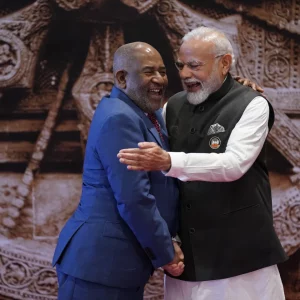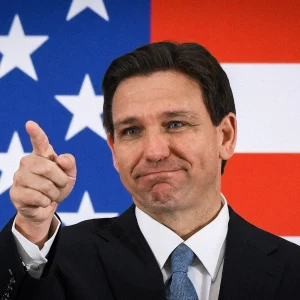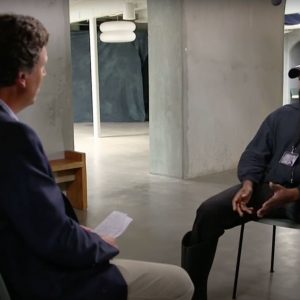
The late night TV show industry has progressed in its short history from the likes of Johnny Carson and David Letterman to the more sharp-tongued and politically focused Jon Stewart and Stephen Colbert. In fact, many of these late night comedy shows have become news sources capable of rivaling traditional shows on FOX or MSNBC. With the upcoming departure of Stewart and the already gone Colbert, a new generation of hosts is beginning to take over. In steps Larry Wilmore, an African-American stand-up comedian and actor who has featured on Stewart’s Tonight Show, to take the reins over from Colbert. Wilmore, however, is more than simply one of the few Black men to ever host a late night show; he is emblematic of a change in culture within America itself. His laid-back style and diverse cast highlight a show that is intended to be more about the viewer than anything else. Although unbeknownst to many, Wilmore is quietly changing the way we consume our late night political comedy.
Take Stewart or Colbert as an example of the prototypical late night host. Colbert exerts a very strong presence on the show and this is certainly due to the nature of him playing a conservative caricature of himself. The laughs come from an in-your-face and cluelessly arrogant personality. Stewart, although less strong in front of the camera, exerts a powerful and magnetic charm on his show; he is the lovable cynic forever wading through the mucky political waters of America. Stewart is supposed to be the voice of reason, while Colbert is there to make us laugh at the absurdity of our political systems. Wilmore, however, makes no attempt at cultivating an image for us. He isn’t a character, he isn’t a cynic, his on-camera personality is at times gleeful and at times sarcastic. But more than anything, Wilmore seems to occupy the role of being relatable and detached. He is as comfortable finishing his guests sentences as he is quietly driving a discussion with a few words.
Wilmore’s show features no format novelties, but instead serves to draw focus away from Larry the personality and instead onto the guests. A common occurrence on the show is the panel discussion. In one episode, running during Black History Month, Wilmore spends the entire show with four guests discussing issues surrounding African-American women. Wilmore comes off as almost a father figure to the viewer. He helps move the conversation forward, but more than anything else, tries to bring out the personality of those around him. This is why the Nightly Show seems more about the guests, than about the host getting the chance to interview them. His hands-off style can, however, be problematic. A recent interview with current New York City Mayor Bill DeBlasio seemed not to probe too deeply or draw DeBlasio away from his campaign talking points. One feature of that interview was Wilmore offering up questions from average New Yorkers for the mayor, further shifting away from Wilmore as the center of attention.
Wilmore’s laid-back approach has resonated with audiences, despite it airing to 963,000 viewers. Although it is a decline over Colbert’s 1.167 million average at the same time, it surpassed Colbert’s demo episode by a few hundred thousand views. Clips from the show on YouTube have garnered over a hundred-thousand hits, which is an impressive feat for a brand new show. Wilmore, as an African-American host who explores issues in the minority community, is intending to reach a different demographic than Colbert or Stewart. However, merely labeling him as a Black late-night host misses the pulse of the show, which features more stand-up comedy influences than anything else. Wilmore, a veteran of the comic stage, surrounds himself with frequent stand-up comic guests. A panel discussing “American Sniper” saw two veterans, a news reporter, and a stand-up comic. Another panel on Islamaphobia followed the similar ratio of one comedian to three more traditional guests on a political show. All of this further backs up Wilmore’s claim throughout the air that this is a comedy show. Wilmore does surrounds himself with comedians who are minorities due to their race, religion, or sexual orientation, but the intention more than anything else is to showcase different styles of humor; the show is therefore less about a Black late night host, than a comedian showcasing the diversity of the public.
All in all, Wilmore represents a break from the old guard of news. He isn’t trying to be a magnetic host like Colbert or Stewart and he isn’t just a funny guy like Letterman or Leno. Larry Wilmore is just trying to be Larry Wilmore; a stand-up comedian who never forgot his minority roots and seeks to shed light on issues pertaining to America’s diversity. Wilmore still has time to develop the show further, but already it represents a fresh look at ourselves from within. Much has been made in recent months about the decentralized nature of mass movements, with Oprah even coming out to critique the lack of leaders in the Ferguson-Garner protests. Wilmore’s detached and relatable personality seems to illustrate the changing tides of our cultural milieu. Perhaps the future has less to do with magnetic leaders and more to do with mobilized masses. Either way, Wilmore seems to be a host for a new generation of political news consumers.




